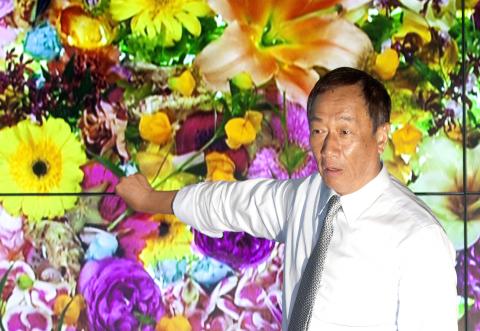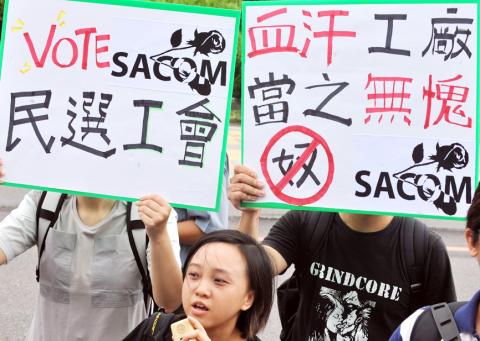Hon Hai Precision Industry Co Ltd (鴻海精密), which assembles iPads and iPhones for Apple Inc, yesterday said it was in talks with Sharp Corp to boost its stake in the Japanese firm to secure advanced technologies for manufacturing high-definition and ultrathin screens.
The collaboration would “beat Samsung,” Hon Hai chairman Terry Gou (郭台銘) told an annual shareholders’ meeting yesterday.
“Sharp’s share price has fallen from [Hon Hai’s] purchasing price of ¥550 to about ¥400 today because of an unfavorable macroeconomy,” Gou said. “We are in talks with representatives sent by the company. We hope to have a chance to invest more.”

Photo: Reuters
On March 27, Hon Hai said it planned to acquire a 9.87 percent share of Sharp through its overseas investment arms and local subsidiary Foxconn Technology Co (鴻準), a computer casings and connectors maker, for about ¥66.91 billion (US$846.5 billion).
Sharp, one of Apple Inc’s major display suppliers for its iPhones, makes high-resolution OLED displays for mobile devices at its sixth-generation plants and also operates an 8.5-generation fab, Gou said.
With the help of Sharp, Hon Hai would gain access to advanced in-cell technology to make touch panels, he said.

Photo: Mandy Cheng, AFP
Market speculation is that Apple would use in-cell touch screens for its new iPhone.
However, Hon Hai faces opposition from Sharp and Japan in selling more shares to Hon Hai, Gou said.
He declined to disclose how many shares his company intended to buy more from Sharp.
Gou said the company did not seek to change the terms reached with Sharp to acquire the stake because of the Japanese company’s lower share price.
Separately, Gou said he had also invested in Sharp’s 10th-generation LCD plant in Sakai, operated by a spin-off of Sharp, Sakai International Corp. He bought a 50 percent stake in the company for ¥66 billion; Sharp holds the other half.
Sakai International plans to trade its shares on the local stock market within the next three years to fund capacity expansion, Gou said.
“Soon, our capacities will not be sufficient. We need to raise funds for expansion,” Gou said.
Sharp’s 10G plant processes glass substrates with optimal cuts of 60-inch, 70-inch, or 80-inch LCD screens.
The new products from the 10G plant are expected to hit the local market in fall, he said.
Gou told investors he was confident that Hon Hai would achieve its revenue growth target of 15 percent this year.
“I’m confident about Hon Hai’s outlook, no matter how bad the global economy might be. We are well prepared [to benefit from new technologies,” Gou said.
Hon Hai is one of the very few companies in the world that are able to make full-line products running on either Apple’s iOS, Google Inc’s Android, or Microsoft Corp’s Windows 8, he said.
Last year, Hon Hai’s consolidated revenue expanded 15.2 percent to NT$3.45 trillion (US$115.4 billion) last year, from NT$3 trillion in 2010, according to the company’s financial statement.
Hon Hai shareholders yesterday gave the green light to its proposal to distribute a cash dividend of NT$1.50 per share and a stock dividend of 10 percent based on last year’s net profit of NT$81.59 billion, or NT$7.65 per share.
Shareholders also approved a rights issue for the firm to sell as many as 1 billion common shares in the form of global depositary receipts to fund its capacity expansion and other plans.

In Italy’s storied gold-making hubs, jewelers are reworking their designs to trim gold content as they race to blunt the effect of record prices and appeal to shoppers watching their budgets. Gold prices hit a record high on Thursday, surging near US$5,600 an ounce, more than double a year ago as geopolitical concerns and jitters over trade pushed investors toward the safe-haven asset. The rally is putting undue pressure on small artisans as they face mounting demands from customers, including international brands, to produce cheaper items, from signature pieces to wedding rings, according to interviews with four independent jewelers in Italy’s main

Japanese Prime Minister Sanae Takaichi has talked up the benefits of a weaker yen in a campaign speech, adopting a tone at odds with her finance ministry, which has refused to rule out any options to counter excessive foreign exchange volatility. Takaichi later softened her stance, saying she did not have a preference for the yen’s direction. “People say the weak yen is bad right now, but for export industries, it’s a major opportunity,” Takaichi said on Saturday at a rally for Liberal Democratic Party candidate Daishiro Yamagiwa in Kanagawa Prefecture ahead of a snap election on Sunday. “Whether it’s selling food or

CONCERNS: Tech companies investing in AI businesses that purchase their products have raised questions among investors that they are artificially propping up demand Nvidia Corp chief executive officer Jensen Huang (黃仁勳) on Saturday said that the company would be participating in OpenAI’s latest funding round, describing it as potentially “the largest investment we’ve ever made.” “We will invest a great deal of money,” Huang told reporters while visiting Taipei. “I believe in OpenAI. The work that they do is incredible. They’re one of the most consequential companies of our time.” Huang did not say exactly how much Nvidia might contribute, but described the investment as “huge.” “Let Sam announce how much he’s going to raise — it’s for him to decide,” Huang said, referring to OpenAI

Nvidia Corp’s negotiations to invest as much as US$100 billion in OpenAI have broken down, the Wall Street Journal (WSJ) reported, exposing a potential rift between two of the most powerful companies in the artificial intelligence (AI) industry. The discussions stalled after some inside Nvidia expressed concerns about the transaction, the WSJ reported, citing unidentified people familiar with the deliberations. OpenAI makes the popular chatbot ChatGPT, while Nvidia dominates the market for AI processors that help develop such software. The companies announced the agreement in September last year, saying at the time that they had signed a letter of intent for a strategic